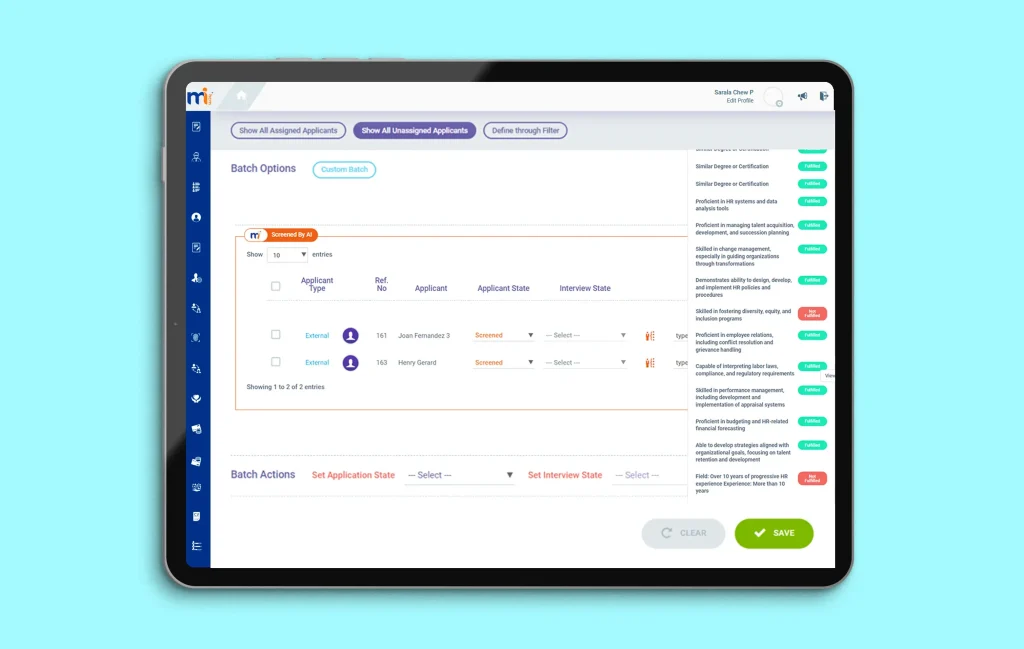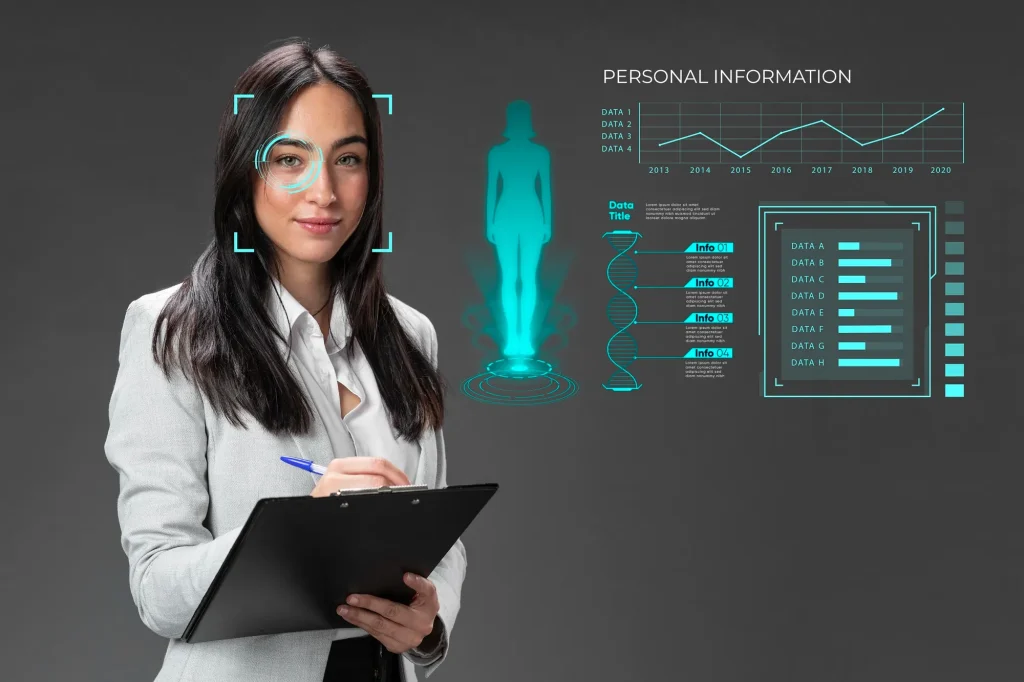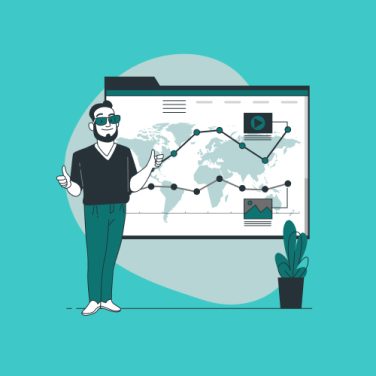Artificial Intelligence (AI) for recruitment is a game-changing force in modern hiring, which is steadily transforming the recruitment landscape.
AI in talent acquisition leverages advanced algorithms and machine learning to streamline the hiring process, enhancing efficiency and fairness. With the ability to handle routine tasks, AI tools allow HR professionals to focus on strategic decision-making and improve candidate experiences.
By integrating AI recruitment examples into workflows, companies can significantly reduce recruiting and hiring costs while accelerating decision-making.
AI recruitment also brings improved engagement through personalised candidate interactions and swift communication, ensuring candidates remain informed and engaged throughout the hiring process.
Key concepts and terms such as predictive analytics, AI-powered candidate screening, and data-driven HR decisions are central to understanding how AI is reshaping talent acquisition.
Today, companies like Google and LinkedIn exemplify the benefits of AI recruitment by effectively utilising AI tools for resume screening and job matching, setting new standards for efficiency and precision in hiring strategies.
With the rise of AI in recruitment, the modern hiring landscape is undergoing a significant transformation. AI is revolutionising candidate screening and selection, drastically changing how HR professionals search for the best-fit talent.
By employing AI tools, organisations can efficiently analyse vast amounts of data, ensuring they find the right candidates swiftly and accurately.
One of the remarkable features of AI in talent acquisition is its capability to enhance recruitment efficiency by matching candidates to job roles seamlessly. AI systems evaluate resumes, experiences, and skill sets to more effectively align candidates with potential positions.
This not only streamlines the recruitment process but also results in quicker hiring decisions, saving companies time and resources.
AI and candidate matching

- AI tools such as those offered by platforms like MiHCM provide a seamless recruitment process, allowing HR teams to assess CVs, conduct evaluations, and swiftly transition candidates through different hiring stages.
- These tools offer the benefit of predictive analytics, assessing candidates’ future performance based on historical data to minimise hiring errors.
- By utilising HR analytics for better decision-making, recruitment professionals can significantly enhance the quality of their hires, fostering a more strategic recruitment strategy.
Furthermore, companies can leverage AI platforms to perform video and chatbot interviews, further simplifying the candidate selection process. Such technologies ensure candidates have a positive experience, minimising delays in the recruitment cycle. In today’s competitive market, the efficiency that AI brings to talent acquisition cannot be overstated.
Ultimately, leveraging AI in recruitment not only optimises time but enhances candidates’ satisfaction and engagement. As businesses integrate these AI-powered solutions, like MiA and MiHCM Data & AI, they pave the way for a more refined, data-driven approach to hiring that aligns with modern workforce dynamics.
Cost efficiency
Integrating AI for recruitment significantly reduces recruitment costs by streamlining repetitive tasks such as resume screening and initial candidate vetting.
This automation diminishes the need for labour-intensive processes, enabling HR departments to allocate resources more effectively. By minimising administrative overhead, organisations can lower their operating expenses and invest more in areas that drive business growth.
Enhanced candidate engagement
Another benefit of AI recruitment is fostering better interactions with candidates. Utilising AI in talent acquisition allows for personalised communications and timely feedback, ensuring candidates feel valued and informed throughout the hiring journey.
Chatbots and automated messaging systems provide immediate responses, significantly improving candidate experience and helping maintain a positive employer brand. This proactive engagement can help attract top talent and reduce application drop-off rates.
Decision-making with AI

The capability of AI to harness data-driven insights is a cornerstone of its value proposition in recruitment.
With advanced analytics, companies can employ predictive models to assess candidates’ future performance, ensuring a quality match between candidates and job roles. This enhanced decision-making process not only bolsters the quality of hires but also contributes to reduced staff turnover and improved workforce stability.
By leveraging these insights, HR professionals can craft more targeted recruitment strategies, thus optimising their hiring outcomes.
Incorporating solutions like MiHCM’s suite empowers companies to achieve these benefits by offering tools that integrate seamlessly with existing systems, thus enhancing the recruitment process further.
As these AI-driven capabilities continue to evolve, the comprehensive advantages they present make a compelling case for their adoption in modern HR practices.
Implementing AI for recruitment brings some challenges in ensuring ethical practices and maintaining fairness, particularly in hiring processes. AI systems, while powerful, can inadvertently carry or exacerbate biases present in the data they are trained on. This can lead to unfair candidate assessments and potentially discriminatory hiring outcomes.
Bias and fairness
AI’s role in candidate screening calls for vigilance against biases. To mitigate such risks, organisations can employ strategies like rigorous testing of AI systems to identify and rectify any biases present.
Ensuring diverse and representative training datasets is vital to promote fairness and inclusivity across recruitment practices. Additionally, maintaining human oversight and intervention remains critical to verifying AI’s decisions align with ethical standards.
Privacy concerns
The use of AI in talent acquisition invokes legitimate concerns around privacy, as AI systems often require vast amounts of data input.
Organisations must address these concerns by implementing clear data privacy policies that emphasise transparency and protect candidates’ data rights. This involves regular audits and updates to privacy protocols, as well as ensuring compliance with relevant laws and regulations.
AI’s transformative potential in using AI in hiring is substantial, but its adoption must accompany strategies dedicated to ethical considerations.
Companies investing in AI-driven recruitment solutions should prioritise building a framework that addresses these ethical challenges, allowing them to harness AI’s capabilities without compromising on fairness or privacy.
Overall, ethical AI deployment in recruitment not only safeguards the integrity of hiring processes but also enhances the overall candidate experience, making it crucial for businesses to stay proactive in their approach to AI ethics.
A step-by-step guide
Implementing AI into recruitment strategies provides organisations with a clear pathway to more efficient and effective hiring processes. Here’s a step-by-step guide to adopting AI tools and enhancing your existing HR practices:
- Assess areas for improvement: begin by identifying specific aspects of your recruitment process that can benefit from AI integration. This might include resume screening, candidate sourcing, or communication.
- Select the right tools: Research and choose AI-driven platforms that align with your organisation’s needs and can streamline candidate matching and onboarding, enhancing overall recruitment efficiency.
- Integrate with existing systems: Ensure seamless integration of AI solutions with your current HR systems. The MiHCM suite offers comprehensive tools that fit into existing workflows, ensuring minimal disruption.
- Upskill HR teams: Train HR professionals to utilise AI tools effectively. Equip them with skills in data analytics and AI technologies to maximise the benefits of AI-driven recruitment strategies.
- Monitor and evaluate: Continuously track the performance of AI tools to adjust strategies as necessary. Use analytics to measure success and identify areas for further improvement.
Faster and more accurate hiring
By implementing AI in recruitment, companies can achieve faster and more accurate hiring outcomes. Benefits include enhanced recruitment efficiency and improved candidate experiences through automated processes.
For instance, Google’s use of custom AI algorithms has drastically cut down resume screening times, allowing HR teams to focus on strategic decision-making. Similarly, LinkedIn’s Talent Hub enhances job matching, providing recruiters with a more efficient pathway to discover the best fit for roles.
Furthermore, Unilever’s integration of HireVue for video interviews has not only expedited the interviewing process but also elevated candidate experiences.
MiHCM’s Talent Acquisition & Onboarding feature provides a well-rounded solution for integrating AI into recruitment, ensuring that teams can achieve strategic goals while maintaining quality and fairness in hiring practices.
Meanwhile, MiHCM’s solutions like MiA have proven impactful in talent acquisition by streamlining onboarding processes, ensuring a seamless transition of candidates into roles.
Balancing human touch with AI
Embracing AI in recruitment offers a myriad of benefits yet calls for a thoughtful approach to maximise its potential while maintaining a human element in hiring processes. This section provides essential guidelines to successfully integrate AI into your recruitment strategies, ensuring a balanced fusion of technology and human touch.
- Blend automation and empathy: While AI efficiently manages repetitive tasks, human interaction is invaluable for understanding candidate nuances. Encourage HR professionals to focus on empathy and personal engagement, complementing AI’s agility.
- Preserve personalisation: Use AI to tailor communications but maintain personalised interactions. For example, automate initial responses with personalised follow-up calls or emails.
- Utilise AI insights, human judgment: Leverage AI analytics for data-driven insights but apply human judgment to interpret results and make final decisions.
Continuous improvement strategies
- Regular system reviews: AI systems require ongoing evaluation to ensure they operate without bias and align with ethical standards. Implement routine audits to verify that outcomes remain fair and inclusive.
- Adapt and upskill: As AI evolves, HR teams must stay updated on advancements. Prioritise training and development to ensure team proficiency in using AI technologies effectively.
- Feedback loops: Encourage continuous feedback from candidates and recruiters to refine AI processes. This helps identify areas for enhancement, driving innovation and user satisfaction.
Adhering to these best practices ensures that AI enhances rather than replaces the essential human elements in recruitment. Organisations like MiHCM exemplify this integration by providing AI tools that complement rather than overshadow HR expertise, driving efficient and person-centric hiring experiences.
Emerging AI trends

The future of AI for recruitment is poised for continued transformation, building on innovations that streamline hiring processes and enhance efficiency.
Predictive analytics, for example, is increasingly being leveraged to forecast candidate success, offering data-driven insights that reduce the risk of poor hires. As AI tools become more sophisticated, they will enable HR professionals to create more diverse and inclusive recruitment strategies.
Language models will play a pivotal role, allowing AI systems to understand and process human language with greater nuance and accuracy. This development will further refine candidate assessments and job matching.
Additionally, there is a growing interest in virtual and augmented reality technologies, which could redefine how candidates experience interviews and workplace culture before joining a company.
Preparing for the future
As AI begins to redefine how decisions are made in talent acquisition, businesses need to ensure that their systems are free from bias and that they protect candidate privacy. Regular audits and updates to AI tools will be crucial for maintaining their ethical standards.
Investing in HR team education is also essential. By equipping professionals with the skills needed to harness these advanced technologies, organisations can optimise their use of AI, driving more strategic, effective hiring practices.
As these trends continue to evolve, embracing AI innovation will be key to remaining competitive in a fast-changing recruitment environment.



